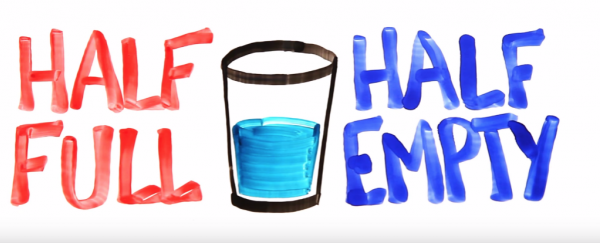Are you an optimist, who says the glass is half-full, or a pessimist, who says the glass is half-empty? Or are you sitting there yelling at us that the glass is full because that empty space up top is filled with all the atoms that make up air? Whether we have a positive or a negative approach to life and the things it throws at us might not actually be in our control, the latest episode of AsapSCIENCE explains, and whichever way you lean can actually affect your lifespan.
Research has shown that those of us with two long alleles - a variant form of a gene - on specific genes that control for serotonin are more likely to focus on positive images, like someone enjoying ice cream, compared to those with a short allele on the same gene, who naturally prefer to focus on negative images, like someone being robbed.
Another factor is the oxytocin receptor gene: if a variation in the gene causes you to have two copies of guanine - one of the four main nucleobases of DNA and RNA - you are more likely to be optimistic with a higher self-esteem than those with copies of another type of nucleobase called adenine. Which means in the same way that positive people are getting a little help from their genes, some people can be genetically susceptible to pessimism.
And when I say optimists are getting help from their genes, I don't just mean you're able to enjoy a better outlook on life. According to AsapSCIENCE, optimistic people are less likely to be rehospitalised after coronary artery bypass surgery, show higher academic achievement, and even a higher socioeconomic status than poor old pessimists.
But things aren't all sunshine and rainbows for people who love sunshine and rainbows. Research has also shown that optimists can sometimes overestimate their abilities and underestimate risk, which can get them into a lot of trouble. Pessimists, on the other hand, have the benefit of a more realistic view of the world, which makes them more cautious about life decisions, and, surprisingly enough, they may even live longer.
The video points to a landmark study that showed pessimistic people were more cautious about their finances and health, and were less likely to engage in risky behaviours such as smoking and excessive drinking, which had a positive effect on how long they were likely to live. High fives! But the bad news is that, statistically speaking, most of us - around 80 percent - are actually hard-wired towards optimism, says AsapSCIENCE, so we won't get to enjoy the benefits of knowing that everything is trying to kill us.
So why are 8 in 10 of us so irrationally positive? I'll let the boys at AsapSCIENCE explain that in the video above, but let's just say you can blame evolution for that one.
